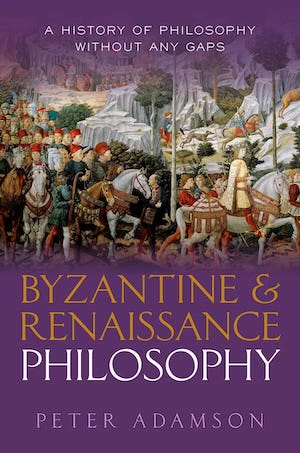Book: Byzantine and Renaissance Philosophy
Manage episode 430861490 series 3588922
Byzantine and Renaissance Philosophy, by Peter Adamson, vol. 6 of A History of Philosophy Without Any Gaps.
Summary:
Peter Adamson presents an engaging and wide-ranging introduction to the thinkers and movements of two great intellectual Byzantium and the Italian Renaissance. First he traces the development of philosophy in the Eastern Christian world, from such early figures as John of Damascus in the eighth century to the late Byzantine scholars of the fifteenth century.
He introduces major figures like Michael Psellos, Anna Komnene, and Gregory Palamas, and examines the philosophical significance of such cultural phenomena as iconoclasm and conceptions of gender. We discover the little-known traditions of philosophy in Syriac, Armenian, and Georgian. These chapters also explore the scientific, political, and historical literature of Byzantium. There is a close connection to the second half of the book, since thinkers of the Greek East helped to spark the humanist movement in Italy.
Adamson tells the story of the rebirth of philosophy in Italy in the fifteenth and sixteenth centuries. We encounter such famous names as Christine de Pizan, Niccolò Machiavelli, Giordano Bruno, and Galileo, but as always in this book series such major figures are read alongside contemporaries who are not so well known, including such fascinating figures as Lorenzo Valla, Girolamo Savonarola, and Bernardino Telesio.
Major historical themes include the humanist engagement with ancient literature, the emergence of women humanists, the flowering of Republican government in Renaissance Italy, the continuation of Aristotelian and scholastic philosophy alongside humanism, and breakthroughs in science.
All areas of philosophy, from theories of economics and aesthetics to accounts of the human mind, are featured. This is the sixth volume of Adamson's History of Philosophy Without Any Gaps, taking us to the threshold of the early modern era.
The Philosophy Garden is a reader-supported publication. To receive new posts and support my work, consider becoming a free or paid subscriber.
My capsule review:
This is the 6th volume in Peter Adamson's ongoing series, "A history of philosophy without any gaps," inspired by his podcast with the same title. All six entries are well worth your time, but I enjoyed this one particularly, for two reasons.
First, I didn't know much about Byzantine philosophy and, as many others, I suspect, I just equated "Byzantine" with boring. Boy, was I mistaken! While still characterized by far too much interest in theology for a secularist like myself, the narrative was decidedly more engaging than I had anticipated. For some reason, the debate between iconoclasts and their critics particularly piqued my interest.
Second, chapters 22-54 (i.e., the bulk of the book) are about Renaissance philosophy, and one simply cannot help but being fascinated by the Italian humanists, so I found myself voraciously reading what Adamson writes about Pico della Mirandola, Niccolò Machiavelli, Lorenzo Valla, Marsilio Ficino, Girolamo Cardano, and all the others (including a fair number of women).
The most heartbreaking chapter is the next to the last, recounting the story of Giordano Bruno and his murder on the orders of the Papal Inquisition. The last chapter is about Galileo, to whom Adamson promises to return after having set the stage some more with his next book, on the Reformation and Counter-Reformation. Stay tuned...
20 episodes





